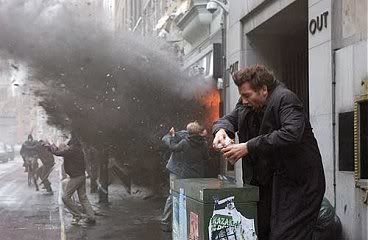It's very odd what happens in a world without children's voices.

Saw Alfonso Cuarón's Children of Men today. Quite a powerful film. Set in the too-near future of 2027, it tells a frightening story of a world where a flu pandemic has rendered the population infertile and where there have been no births in 18 years. (Much is made early on about the sudden death of "Baby Diego," who has lived his entire life in the spotlight as the "youngest person on the planet," a mantle he evidently found wearying.) It's also set in a fascist, isolationist Britain, which is apparently the only world power left standing and tries to keep it that way by rounding up all of its immigrants and undesirables. And for those seeking a peaceful end, there's Quietus -- but not many people in this film come to peaceful ends.
Clive Owen stars as an ordinary citizen toiling away at the Ministry of Energy for whom an average day includes just missing a terrorist bombing in a London coffee shop and passing cages crammed with refugees on his way to and from work. About his only pleasure comes from visiting retired political cartoonist Michael Caine, who lives off the grid with his invalid wife and grows pot. Then Owen is abducted by the Fishes, the pro-immigrant underground organization headed by his ex-wife Julianne Moore, who has a special job for him. The job turns out to be escorting a miraculously pregnant refugee named Kee (Claire-Hope Ashitey), who's watched over by former midwife Pam Ferris, to the ominously named off-shore group "The Human Project."
Along the way there are encounters with an art preservationist played by Danny Huston (whose projects include a restoration of Michelangelo's David and a recreation of the cover of Pink Floyd's Animals), a zealous revolutionary played by Chiwetel Ejiofor, and an opportunistic copper played by Peter Mullan. Cuarón's restless camera breathlessly gets us from place to place, occasionally in extended, unbroken takes that put us right in the middle of the action without being showy about it. Without the option of cutting away, you can bet some of the longer takes were a bit hairy to shoot -- especially since Cuarón saves them for the most complicated action sequences.
It's a film of dire warning, but ultimately of hope as well. And any film that presents King Crimson's "In the Court of the Crimson King" as a cultural artifact worth preserving is all right in my book.